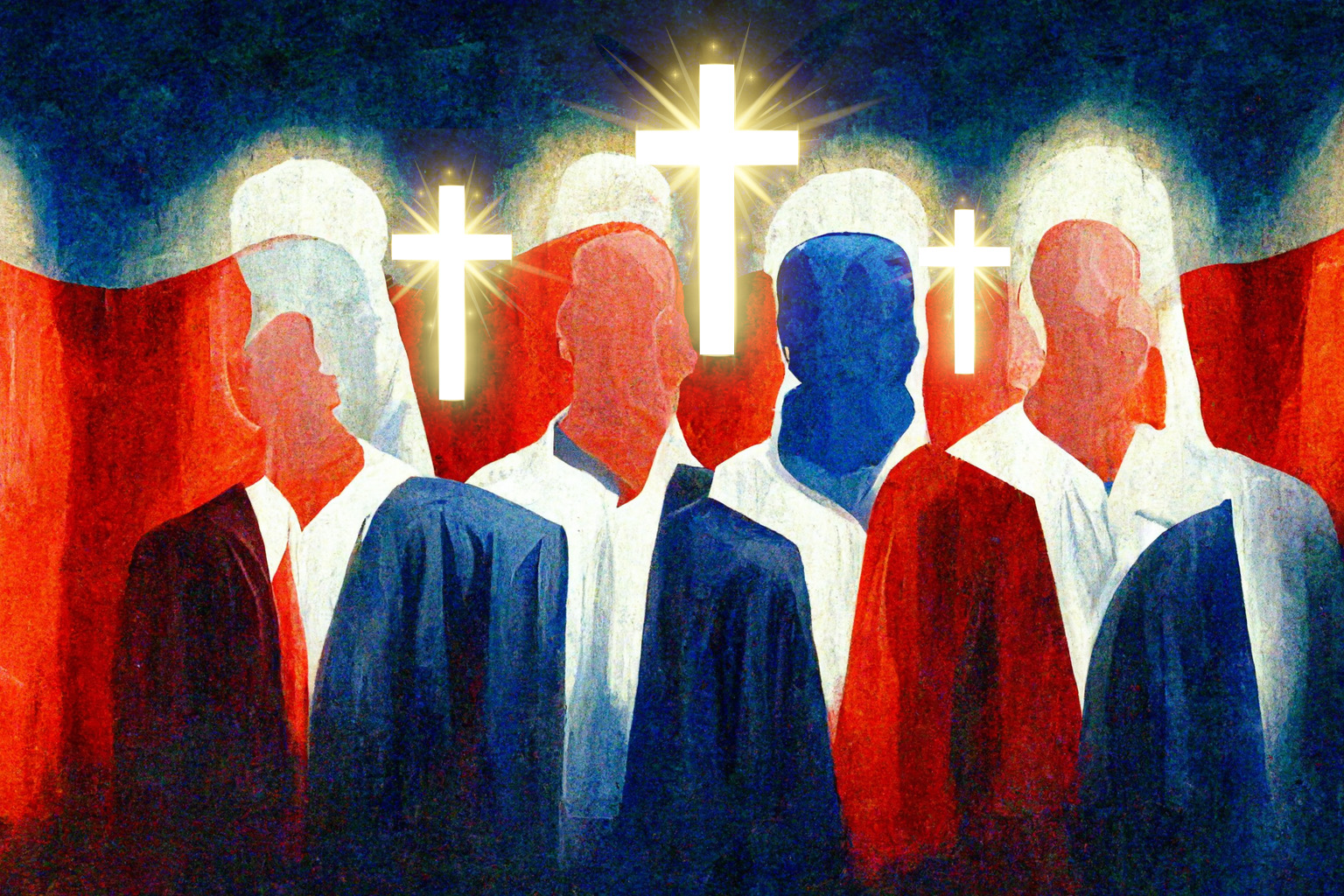National Conservatism’s Motivated Minority

MIAMI—National conservatism has gotten plenty of press in recent years, but defining what exactly the movement stands for is often difficult. The Edmund Burke Foundation, which has sponsored several “NatCon” conferences, recently took on that challenge. “National Conservatism: A Statement Of Principles” laid out 10 organizing themes—from promoting national independence and the rule of law to rejecting imperialism and globalism. While the authors believe that “Jews and other religious minorities are to be protected in the observance of their own traditions,” the document states that “where a Christian majority exists, public life should be rooted in Christianity and its moral vision.”
Christianity was indeed one of the driving forces at the third annual NatCon convention in Miami this month, as was the fear of losing that Christian majority. Today 65 percent of American adults identify as Christian, a 12-point drop from a decade ago. Only 47 percent of Americans belong to any religious institution. And just over a third of Americans attend a religious service once a week. Perhaps the greatest question for national conservatives is whether the movement is doomed by these trends or poised to reverse them.
R.R. Reno, co-author of the statement of principles and editor of the religious journal First Things, sees a Christ-centered conservative nationalism as the solution. He recalled in an interview with The Dispatch the sense that, during his childhood in the 1960s, “Christianity transcended partisan divides in the country.” He lamented that Christian faith went from a presumed baseline to “the forefront of various political differences.”
National conservatism’s ultimate goal is to reorient American politics—presumably by winning national elections. But it is still far from the dominant force in the Republican Party or the American right. A traditional model of political success would dictate building a majority coalition and, by necessity, welcoming non-Christians into the fold. Figures like Edmund Burke Foundation Chairman Yoram Hazony, who is Jewish and co-wrote the principles document, clearly feel at home in the movement. But at NatCon 3 it was obvious that the movement’s true believers are wary of secularists in their midst.
Reno acknowledged the presence of some non-religious NatCons with socially liberal views but suggested they “are a small minority.” He said the three issues that motivated the national conservatism community were faith, family, and the flag. If an atheist is present, Reno suggested, “it’s probably the flag thing that’s really drawing him and other people.” While Reno thinks the “extreme edge of the LGBT project” has nonreligious opponents, “typically, it’s the religious people that are the forefront of actually speaking out in public.”
Christian national conservatives don’t buy the premise that they need to water down their views to expand their appeal (and thereby expand their power). “I think that a motivated minority can be very influential on cultural policy,” said Reno. “And this is true for the left. The woke left is not the majority of the country, but they’re a very motivated minority.” He added, “Let’s say social conservatives more broadly, that might be 25 percent of the population, we can set the tone for the country.”
“If there’s anything that the last 40 years have taught us, it’s that a very, very motivated small cadre that’s committed to a particular moral vision can get what they want,” observed American Moment President Saurabh Sharma in a panel discussion with Reno.
Some national conservatives are still willing to work with the post-religious right—so long as everyone remembers who is running the show. “I wouldn’t mind them joining the cause, as long as they submitted to the general rules and principles thereof, which I think can be guided by sacred scriptures,” Rev. Uri Brito, who delivered one of NatCon 3’s benedictions, told The Dispatch. “I would not want to be a part of a movement where atheists are guiding that movement.”
It’s unclear whether more secular figures would be interested in this kind of bargain, though the national conservatives are open to the idea. Elon Musk offers an interesting test case. Could the billionaire, who announced this year that he was planning on voting Republican, have a place in the movement?
His strong anti-woke stance drew praise from some conference participants. During a panel on Catholicism and nationalism, Matthew Peterson, vice president of the Claremont Institute, brought up Musk as an example of an elite “in the good sense” because he still cares about “excellence” and the direction of the country.
Yet Musk is a vocal proponent of psychedelic drugs and smoked marijuana on Joe Rogan’s podcast. He generally has stayed silent on the issue of abortion, though his company Tesla pays for employees to procure the procedure.
When asked about Tesla subsidizing employees’ abortions, and where to draw the line between political ally and opponent, Peterson said he doesn’t think Musk is an ally to conservative Christians “in some full sense.” But he still defended him: “Why is Musk great? I would say what’s incredible is he has a pro-human philosophy that is throughout his companies. Even though he flirts with transhumanism his reasoning is always pro-human.” Peterson’s co-panelist Helen Roy, a contributing editor at The American Mind, agreed, adding that “it’s really important not to purity spar before we’ve even won.”
The conference ended with an address from Albert Mohler, president of the Southern Baptist Theological Seminary. “Insofar as conservatism, as a movement, has a future, it is a future that is going to be increasingly tied to explicitly theological claims and confessions or there will be nothing left to conserve,” he asserted.
That’s an appealing message for religious Americans understandably worried about their declining influence. Whether this motivated minority can translate those concerns into a bigger coalition—and, eventually, political wins—is another question.